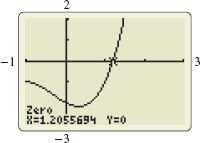EXAMPLE 5Using Newton’s Method to Approximate a Real Zero of a Function
Use Newton’s Method to find a fourth approximation to the positive real zero of the function f(x)=x3+x2−x−2.
Solution Since f(1)=−1 and f(2)=8, we know from the Intermediate Value Theorem that f has a zero in the interval (1,2). Also, since f is a polynomial function, both f and f′ are differentiable functions. Now f(x)=x3+x2−x−2andf′(x)=3x2+2x−1
236
We choose c1=1.5 as the first approximation and use Newton’s Method. The second approximation to the zero is c2=c1−f(c1)f′(c1)=1.5−f(1.5)f′(1.5)=1.5−2.1258.75≈1.2571429
Use Newton’s Method again, with c2=1.2571429. Then f(1.2571429)≈0.3100644 and f′(1.2571429)≈6.2555106. The third approximation to the zero is c3=c2−f(c2)f′(c2)=1.2571429−0.31006416.2555102≈1.2075763

The fourth approximation to the zero is c4=c3−f(c3)f′(c3)=1.2075763−0.01160125.7898745≈1.2055726